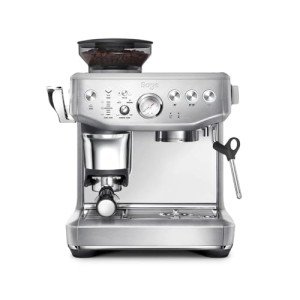The Rise of Home Espresso Machines: A Comprehensive Guide
As coffee enthusiasts continue to look for fresh and tasty brews in the house, the appeal of home espresso machines has surged in the last few years. No longer just the domain of cafes and coffee stores, these machines empower individuals to craft barista-quality espresso beverages from the comfort of their cooking areas. This article will explore the different kinds of home espresso machines, their functions, and considerations for picking the right one. Furthermore, it will supply a selection of FAQs to assist prospective buyers make notified decisions.
Kinds Of Home Espresso Machines
Home espresso machines can be categorized into a number of classifications based upon their systems and user-friendliness. Each type has its distinct features, pros, and cons.
| Type | Description | Pros | Cons |
|---|---|---|---|
| Manual Espresso Machines | Requires the user to manually manage the brewing procedure, including techniques like pulling a lever to develop pressure. | - Complete control over brewing procedure - Compact style | - Requires skill and practice - Time-consuming |
| Semi-Automatic Machines | Machine automates water flow and pressure, but the user still manages the dosing and period of the brewing process. | - Balance of automation and control - Versatile | - Learning curve for refining techniques |
| Totally Automatic Machines | Automates the entire developing process, from grinding to brewing, typically with programmable settings for tailored beverages. | - Extremely easy to use - Quick and convenient | - Less control over the brewing procedure - Higher cost point |
| Pill or Pod Machines | Uses pre-packaged espresso capsules or pods to develop coffee quickly and easily. | - Extremely easy to use - Minimal cleanup | - Limited taste variety - More costly per cup than ground coffee |
| Super-Automatic Machines | Combines functions of totally automatic machines with integrated mills, enabling users to brew whole bean espresso and milk-based beverages with one touch. | - All-in-one benefit - Ideal for milk-based beverages | - Often the most pricey - Can be bulky |
Functions to Consider
When picking a home espresso machine, potential buyers ought to consider the following features to guarantee they select a machine that fulfills their requirements:
Grinder Type:
- Built-in grinders can supply fresher grounds but may require more upkeep.
- Separate grinders enable more personalization of grind size.
Pressure:
- Look for machines that produce a minimum of nine bars of pressure, which is optimum for developing espresso.
Water Temperature Control:
- Machines with adjustable temperature settings permit better extraction of taste from beans.
Milk Frothing Options:
- Consider whether you desire a manual steam wand for frothing or an automatic milk frother for benefit.
Alleviate of Cleaning:
- Machines with removable parts and self-cleaning functions significantly lower clean-up time.
Size and Design:
- Ensure the machine fits comfortably in your cooking area and aligns with your visual choices.
Budget:
- Set a budget before beginning your search, as prices can range considerably from affordable models to high-end machines.
Advantages of Home Espresso Machines
Owning a home espresso machine offers many advantages:
- Cost-Effective: Over time, developing espresso in the house can save coffee lovers money compared to frequent café check outs.
- Personalization: Users can try out various beans, grind sizes, and brewing techniques to discover their perfect cup.
- Convenience: The capability to brew espresso any time gets rid of the requirement to go out to a coffee shop, particularly helpful during late nights or mornings.
- Quality Control: With a home machine, individuals have total control over the quality of ingredients and developing procedures.
Downsides of Home Espresso Machines
However, there are some disadvantages to consider:
- Initial Investment: High-quality espresso machines can be costly, needing a considerable in advance investment.
- Knowing Curve: Mastering the art of espresso brewing can take time and practice, which may be intimidating for novices.
- Upkeep: Like any device, espresso machines need routine cleansing and maintenance to make sure optimum performance.
FAQs
1. What is the very best kind of home espresso machine for novices?
Response: For newbies, a semi-automatic machine is often advised as it uses a balance in between control and automation, enabling you to find out the fundamentals without frustrating complexity.
2. Just how just click the next article should I invest on a home espresso machine?
Answer: Entry-level machines can begin around ₤ 100 to ₤ 300, while higher-end designs can vary from ₤ 500 to over ₤ 2000. It's important to set a budget based on your anticipated use and wanted functions.
3. Do I need a separate grinder?
Response: While some espresso machines come with built-in mills, buying a different grinder allows for higher customization and makes sure better quality premises.
4. How typically should I clean my espresso machine?
Response: Cleaning frequency can vary by machine type, but it's generally advised to clean up the machine after each use and perform deep cleanings weekly or monthly, depending upon usage.
5. Can I make milk-based drinks with any espresso machine?
Response: Not all machines include milk frothing abilities. If you take pleasure in drinks like lattes or coffees, look for a machine with a steam wand or automatic frother.
Home espresso machines are transforming the method coffee connoisseurs enjoy their beloved brews. With numerous types and advanced features available in the market, there is something for everybody. Whether it's the happiness of creating unique recipes or merely savoring the ideal shot of espresso, investing in a home espresso machine can enhance both the coffee-drinking experience and the lifestyle for coffee lovers everywhere. Just like any financial investment, it is crucial to weigh the benefits versus the possible downsides and select a machine that seamlessly fits both your lifestyle and preferences.

